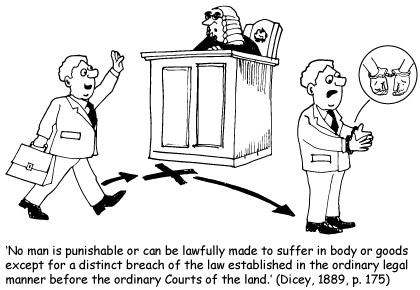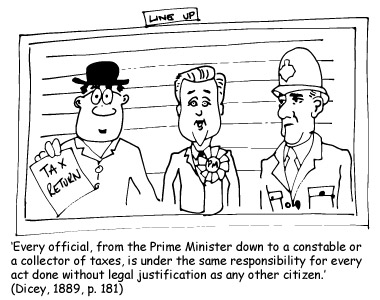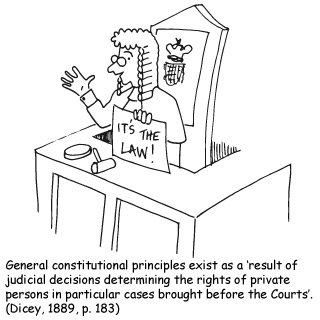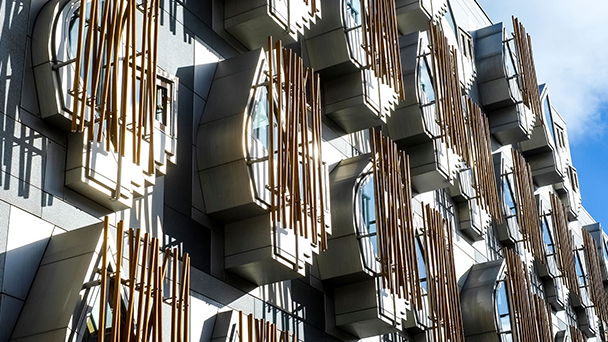4.1 The rule of law and UK's constitution
You should now be familiar with the rule of law and the constitutional arrangements of the UK. Activity 2 has been designed to test your knowledge of the rule of law and UK’s constitutional arrangements.
Activity 2 The rule of law
You have learnt that the rule of law is a fundamental principle underpinning the constitution of the UK. This Activity is designed to test your knowledge of the rule of law as you will return to the rule of law when exploring the powers of the Scottish Parliament, delegated legislation, Members of Scottish Parliament (MSPs) and Members of Parliament (MPs).
Consider each of the statements below and select the statements which reflect the rule of law.
a.
True
b.
False
The correct answer is a.
Comment
The rule of law protects rights and liberties. This requires that a person’s rights and obligations are determined by the law, that wrongs are punished according to law and that everyone is subject to the law.
a.
True
b.
False
The correct answer is a.
Comment
States everything must be done in accordance with the law (legality). For example, a public authority must not do something which affects a person’s rights or liberty (e.g. decide to refuse planning permission) unless Parliament has given it authority to do so, either in an Act of Parliament or indirectly by subordinate legislation..
a.
True
b.
False
The correct answer is a.
Comment
Requires that government is carried out within a stable framework of rules and principles which place appropriate restrictions on the exercise of power. This is why the judiciary has developed a series of administrative law rules) which public bodies are required to observe when exercising discretionary powers. This provides certainty and predictability and prevents the abuse of discretionary power.
a.
True
b.
False
The correct answer is a.
Comment
States no one should be judge in his or her own cause. Therefore, disputes about the legality of something done by the government are decided by a judiciary which is independent of the government. Judicial independence is seen as a cornerstone of the UK’s constitution.
a.
True
b.
False
The correct answer is a.
Comment
States there will be fairness as between the government and its citizens. In other words, public bodies should generally be subject to the same legal duties and liabilities as individuals, unless this is inconsistent with their government functions.
a.
True
b.
False
The correct answer is a.
Comment
Requires that procedures for determining legal disputes must be fair, and must not involve inordinate delay or prohibitive cost. This is a principle about providing access to justice.
a.
True
b.
False
The correct answer is a.
Comment
Upholds fundamental human rights and the UK’s compliance with its obligations under international law. As you will learn foreign affairs are reserved to the UK Parliament.
a.
True
b.
False
The correct answer is a.
Comment
Requires that the law is written in language that is, so far as possible, clear and free from ambiguity. Laws must avoid contradictions and must not command the impossible. Laws must be forward looking (prospective), in other words they must not be backdated (retrospective). This is a principle about how the law is written down and published.
a.
True
b.
False
The correct answer is a.
Comment
Must be observed at all stages of the law making process. It is relevant when deciding the content of laws, when drafting laws and when public bodies and the courts administer and enforce the law.
a.
True
b.
False
The correct answer is a.
Comment
Laws must also be freely available. Laws of both the Scottish and UK Parliaments are available electronically as the case reports of the UK Supreme Court, High Court of Justiciary and other appeal courts.
Figures 13, 14 and 15 take the form of cartoons which represent aspects of the rule of law and provide an example of an alternative way in which the rule of law can be illustrated.



